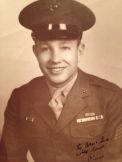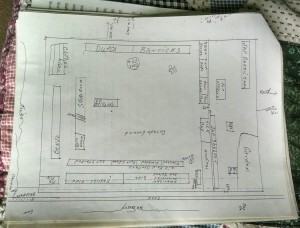August 9, 1945 was a nightmare from 12:15 noon until 6:00 p.m., and the events of that day I shall remember the rest of my life. At 6:00 a.m. we had an early morning alert. We all took to the trenches as seventeen American planes flew over our camp, and Kamaishi. They were the carrier type planes but didn’t drop anything. The working parties fell out to go to their respective jobs at 7:00. I stayed behind still working on air raid trenches, a job I had been on since July 10. The hours passed by, but we were wtill [sic] on the alert. More planes came and went without any activity from above, but the Japs anti-aircraft opened fire on the American planes, but I could not see any damage done. I thought they had hit one plane as it broke formation and went into a spin and dropped about two to three thousand feet, but the pilot pulled it out and it got back into formation before the other planes were out of sight. About thirty minutes later three planes came back and dove on some objective on the side of the mountain opposite our camp. I don’t know what they hit, but a terrific explosion occurred a few minutes later.
The water party consisted of the trench detail of ten men and ten other camp workers made one trip for water, as we had none in camp since the shelling we went through on July 14 from Task Force 58.
About 11:45 we heard motors of planes and looking up saw two sea planes. The Japs opened AA upon them. I remarked to my buddy Jack Elkins, USMC. who was sharing the fox hole with me that we could sure stand by for a ram as those planes were from battle ships and cruisers. Lt. Braxton of the R.E. told me to get under cover for he had just seen three battle ships out at sea. He had a pair of field glasses that somehow he had managed to keep.
The first salvo of shells came over at 12:15, and they were heavy and landed just about two hundred yards over our camp. The shelling lasted for two and one-half hours. The shells were hitting in camp, around camp in the steel mill and in the city of Kamaishi. When they left, the whole place was in ruins and flames. About thirty minutes before the shelling stopped, the camp was completely destroyed. There was one sixteen inch shell and twelve smaller caliber that hit in our camp area.
There were seventy-two men in camp and only ten of them escaped serious injury. I thank God that I was lucky enough to come out with only a flesh wound and a slight burn on my forehead. On [sic] Dutch man who was hurt on the shelling on the 14th of July burned to death. A Marine by the name of Earl Gaskins, a close buddy of mine, was burned while still in the air raid trench.
It was horrible to see the condition of some of the men and the way they were burned. We fought fire and carried out what food we could that was stored in the Air Raid trench as it caught fire, but the food was the only thing saved in the whole camp. I threw a blanket over my head and retrieved Lt. Baxter’s medical bag as it contained all of the medical instruments we had in camp.
While the shelling was still going on and our camp was burning, we took to the river and to the water front. There I could see the ships going by and firing as they went. We, the few able-bodied, carried the wounded and dying out to the water front and rendered what first aid we could. We did not have any medicine for treatment, so the best we could do was to tear up the clothes we were wearing and try to wrap them to keep the air from the burns. We stayed in this area until the shelling was over, then we returned to where the camp had been and started making places to bed down the wounded men. During the night three other men died from the burns they had received. Two were Englishmen and the other a New Zealander.
The only chow we had that night was what we could salvage in the ruins of the camp. Three other fellows, Jack Elkins, Buddy Gaffey, Doyle Warner and I made it out all right. Warner and I were the most able-bodied of the four, so we set out to get chow. There were four hogs that had burned to death in camp. We cut off a hind leg, got some burned rice from the location of the store room, and got some sugar that was in the Jap’s store room. Then we got some leeks and some marble-sized potatoes and made a pretty good stew. We all ate our fill, and I can truthfully say that I have never tasted anything that tasted better in my life, as I was the fullest and felt most contented I had since becoming a prisoner of war. What we did not eat, we gave to the other sick and wounded men. The above statements will give you some idea of what happened on that miserable date. Also, the following sketch of the camp will show you what little protection we had.


An excellent post.
double bill by s. ayoade. awesome!!! available on amazon.
war is a terrible thing.